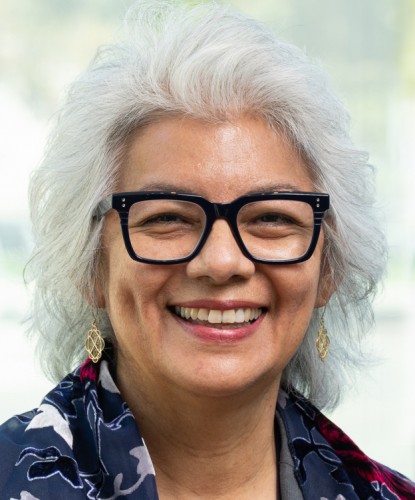Gloria M. Rodriguez
Professor and Associate Dean of Faculty Affairs
Office hours: Winter and Spring Quarters 2020 — By Appointment Only
Gloria M. Rodriguez’s current research explores notions of educational investment that reflect efforts to build upon community strengths in order to address community needs within and beyond educational settings. Dr. Rodriguez also engages in research that focuses on the political economic conditions and educational trajectories of Chicana/o-Latina/o communities, other communities of color, and low-income populations in the U.S.
Current projects include Leadership for Real Impact (LRI) in K-12 schools and Community Colleges; Project EXCEL (Examining College Choice, Enrollment & Linkages); Testimonios of Educational Leadership in K-12 and Higher Education: Abriendo Puertas, Cerrando Heridas (Opening Doors, Closing Wounds) book project & Association of Mexican American Educators (AMAE) Journal special issue on testimonios of Latina/o educational leadership, guest co-editor with Dr. Rebeca Burciaga, San José State University.
Research Interests
School finance/resource allocation and educational leadership from a critical, social justice perspective. Interested in understanding notions of educational investment that reflect efforts to build upon community strengths in order to address community needs within and beyond educational settings. Also engage in research that focuses on the political economic conditions and educational trajectories of Chicana/o-Latina/o communities, other communities of color, and low-income populations in the U.S.
Education
Ph.D., Education: Administration and Policy Analysis with minor in Organizational Studies – Stanford University – 1997
M.P.A. – Columbia University, School of International & Public Affairs (emphasis in educational policy) – New York, NY – 1989
B.A., Economics – U.C. Santa Cruz – 1986
A.A., Business (transfer student) – College of the Sequoias - Visalia, CA – 1984
Select Publications
Rodriguez, G.M. & Rolle, A.R. (Eds.) (2007). To What Ends and by What Means? The Social Justice Implications of Contemporary School Finance Theory and Policy, Routledge.
–Contributed chapter: Rodrigeuz, G.M., Cycling on in Cultural Deficit Thinking: California School Finance and the Possibilities of Critical Policy Analysis, pp. 107-143.
Rodriguez, G.M. & Cruz, L. (2009). The Transition to College of English Learner and Undocumented Immigrant Students: Resource and Policy Implications, Teachers College Record, 111(10), pp. 2385-2418.
Rodriguez, G.M. & Fabionar, J.O. (2010). The Impact of Poverty on Students and Schools: Exploring the Social Justice Leadership Implications in Marshall & Oliva (Eds). Leadership for Social Justice: Making Revolutions in Education (2nd Ed.), pp. 55-72. Boston: Allyn & Bacon.
Rumberger, R. W. & Rodriguez, G. M. (2011). “Chicano Dropouts,” in Chicano School Failure and Success: Past, Present, and Future, 3rd Edition, R. Valencia (Ed.), pp. 76-98, Routledge.
Rodriguez, G. M. (2013). “Power and Agency in Education: Exploring the Pedagogical Dimensions of Funds of Knowledge.” Review of Research in Education, Vol. 37, pp. 87-120.
Figueroa, J.L. & Rodriguez, G.M. (2015). “Critical Mentoring Practices to Support Diverse Students in Higher Education: Chicana/Latina Faculty Perspectives.” New Directions for Higher Education, n171 pp. 23-32.
Hernandez, F., Murakami, E., Rodriguez, G.M. (Eds.). (2015). Abriendo Puertas, Cerrando Heridas (Opening Doors, Closing Wounds): Latina/os Finding Work-Life Balance in Academia. Work-Life Balance Series, Information Age Publishing.
Rodriguez, G. M. & Brazil-Cruz, L. (2016). “Institutional Responsiveness to the Increasing Latina/o Student Population: An Educational Leadership Imperative,” in B. Jones & A. Rolle (Eds.), Leading Schools in Challenging Times: Eye to the Future, pp. 157-180, Information Age Publishing.
Professional Experience
Assistant Professor, Tenure-Track — California State University, Hayward (now East Bay) — 2001-2004; University of Texas at El Paso (UTEP) — 1998-2001.
Director, School-linked Services/Healthy Start Coordinator — New Columbus (now Rosa Parks) Elementary School, Berkeley, CA – 1997-1998.
Fiscal & Policy Analyst, California Legislative Analyst’s Office — 1989-1991 (intern, summer 1988)
Awards and Honors
- Teaching Award from the UCD Education Graduate Students Association, 2008.
- Award for Excellence in Teaching. The University of Texas at El Paso College of Education. 2000.
- Jean Flanigan Award for Outstanding Dissertation of 1997-98. American Education Finance Association. 1998.
- National Hispanic Scholarship Fund. 1996.
- Chicana/o Fellows Program – Dissertation and Teaching Fellowship. Stanford University, School of Humanities and Sciences, 1994-1995.
Current Activities and Service
- Affiliate: UCD Designated Emphasis, Feminist Theory & Research; Department of Chicana/o Studies; UCD Center for Poverty Research.
- Member, Board of Directors, American Education Finance Association, 2009 to 2012 (also served on the AEFA Board 2000-2003).
- Member, AERA Divisions — A–Administration, G–Social Context of Education, L–Educational Policy; SIGs — Critical Educators for Social Justice, Fiscal Issues, Policy, & Education Finance, Hispanic Education, Leadership for Social Justice.
- Member, Editorial Boards, Educational Administration Quarterly (2014-2017–second term); Journal of Education Finance (2015-2018); Educational Policy Analysis Archives (2016-2018).
Courses Taught at UC Davis
CANDEL — Contemporary Leadership/Orientation to the Ed.D.; Problem-Based Learning I.
Ph.D. Program — Social Justice Frameworks in Education
Chicana/o Studies — Political Economy of Chicana/o Communities
Funded Research
Co-PI — Healthy Youth/Healthy Regions Project (Lead PI: Jonathan London)
Lead PI — Healthy Start Sustainability Stories









